
Charles John Huffam Dickens was an English novelist, journalist, short story writer and social critic. He created some of literature's best-known fictional characters, and is regarded by many as the greatest novelist of the Victorian era. His works enjoyed unprecedented popularity during his lifetime and, by the 20th century, critics and scholars had recognised him as a literary genius. His novels and short stories are widely read today.
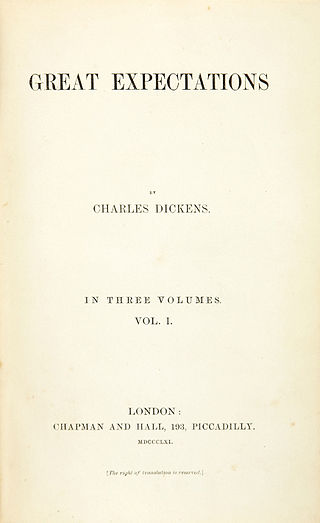
Great Expectations is the thirteenth novel by English author Charles Dickens and his penultimate completed novel. The novel is a bildungsroman and depicts the education of an orphan nicknamed Pip. It is Dickens' second novel, after David Copperfield, to be fully narrated in the first person. The novel was first published as a serial in Dickens's weekly periodical All the Year Round, from 1 December 1860 to August 1861. In October 1861, Chapman & Hall published the novel in three volumes.

Bleak House is a novel by English author Charles Dickens, first published as a 20-episode serial between 12 March 1852 and 12 September 1853. The novel has many characters and several subplots, and is told partly by the novel's heroine, Esther Summerson, and partly by an omniscient narrator. At the centre of Bleak House is a long-running legal case in the Court of Chancery, Jarndyce and Jarndyce, which comes about because a testator has written several conflicting wills. In a preface to the 1853 first edition, Dickens said there were many actual precedents for his fictional case. One such was probably Thellusson v Woodford, in which a will read in 1797 was contested and not determined until 1859. Though many in the legal profession criticised Dickens's satire as exaggerated, Bleak House helped support a judicial reform movement that culminated in the enactment of legal reform in the 1870s.
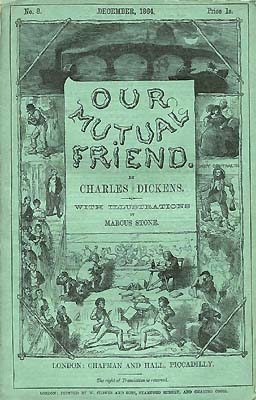
Our Mutual Friend, published in 1864–1865, is the last novel completed by English author Charles Dickens and is one of his most sophisticated works, combining savage satire with social analysis. It centres on, in the words of critic J. Hillis Miller, quoting the book's character Bella Wilfer, "money, money, money, and what money can make of life".
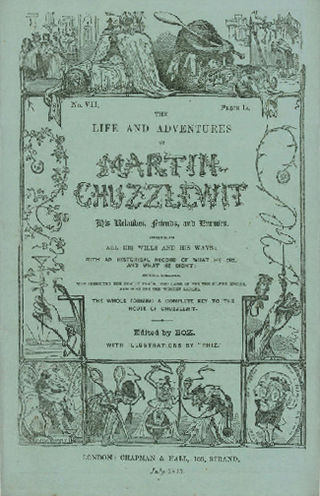
The Life and Adventures of Martin Chuzzlewit is a novel by English author Charles Dickens, considered the last of his picaresque novels. It was originally serialised between January 1843 and July 1844. While he was writing it Dickens told a friend that he thought it was his best work thus far, but it was one of his least popular novels, judged by sales of the monthly instalments. Characters in this novel gained fame, including Pecksniff and Mrs Gamp.
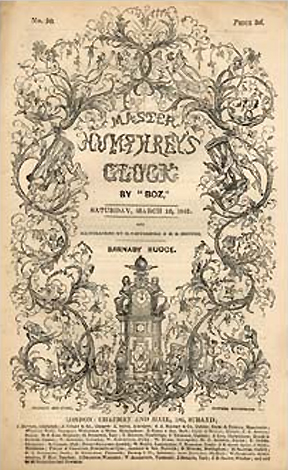
The Old Curiosity Shop is the fourth novel by English author Charles Dickens; being one of his two novels published along with short stories in his weekly serial Master Humphrey's Clock, from 1840 to 1841. It was so popular that New York readers reputedly stormed the wharf when the ship bearing the final instalment arrived in 1841.

Master Humphrey's Clock was a weekly periodical edited and written entirely by Charles Dickens and published from 4 April 1840 to 4 December 1841. It began with a frame story in which Master Humphrey tells about himself and his small circle of friends, and their penchant for telling stories. Several short stories were included, followed by the novels The Old Curiosity Shop and Barnaby Rudge. It is generally thought that Dickens originally intended The Old Curiosity Shop as a short story like the others that had appeared in Master Humphrey's Clock, but after a few chapters decided to extend it into a novel. Master Humphrey appears as the first-person narrator in the first three chapters of The Old Curiosity Shop but then disappears, stating, "And now that I have carried this history so far in my own character and introduced these personages to the reader, I shall for the convenience of the narrative detach myself from its further course, and leave those who have prominent and necessary parts in it to speak and act for themselves."
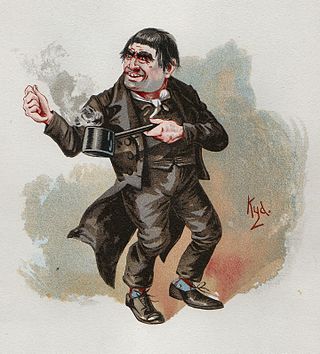
Daniel Quilp is one of the main antagonists in the novel The Old Curiosity Shop by Charles Dickens, written in 1840. Quilp is a vicious, ill-tempered and grotesque dwarf and is the villain of the story. Quilp is as near as Dickens ever came to creating a monster. Actors who have portrayed him include Hay Petrie, Anthony Newley, Patrick Troughton, Trevor Peacock, and Toby Jones.

The Old Curiosity Shop is a British television film adapted from the Charles Dickens's 1841 novel The Old Curiosity Shop. It stars Irish actress Sophie Vavasseur as Nell Trent, with Derek Jacobi as her grandfather, Toby Jones as Quilp and George MacKay as Nell's friend, Kit. It was broadcast on 26 December 2007 on ITV. The adaptation is in general very faithful to the novel. The most significant changes are the removal of the Garlands and their household and the identity of the Single Gentleman who is changed from Grandfather's brother to his estranged son and Nell's father.
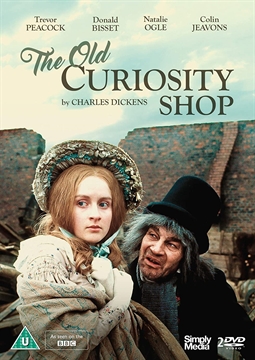
The Old Curiosity Shop is a nine part 1979 BBC TV series based on the 1841 novel by Charles Dickens. It was directed by Julian Amyes, and adapted by William Trevor.
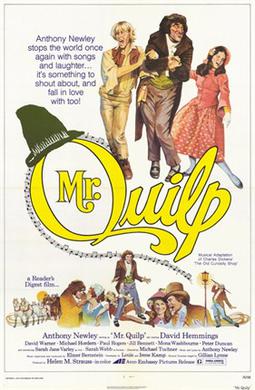
Mister Quilp is a 1975 British musical film directed by Michael Tuchner and starring Anthony Newley, David Hemmings and Jill Bennett. It is based on the 1841 novel The Old Curiosity Shop by Charles Dickens.

The Old Curiosity Shop is a 1934 British drama film directed by Thomas Bentley and starring Elaine Benson, Ben Webster and Hay Petrie. It is an adaptation of Charles Dickens' 1841 novel The Old Curiosity Shop.

Joseph Clayton Clark, who worked under the pseudonym "Kyd", was a British artist best known for his illustrations of characters from the novels of Charles Dickens. The artwork was published in magazines or sold as watercolor paintings, rather than included in an edition of the novels.
The Old Curiosity Shop is a 1921 British silent drama film directed by Thomas Bentley and starring Mabel Poulton, William Lugg and Hugh E. Wright. It is based on the 1841 novel The Old Curiosity Shop by Charles Dickens. Bentley remade the novel as a sound film in 1934.
The Bleak Old Shop of Stuff is a four-part comedy series produced by BBC, which premiered on BBC Two on 19 December 2011. It is a parody of the works of Charles Dickens, drawing its title from Bleak House and The Old Curiosity Shop. It is a television successor to Bleak Expectations, a radio parody of Dickens which began in 2007, and with which it shares the writer Mark Evans, producer Gareth Edwards and actor Richard Johnson; while not a direct adaptation it shares the same style, atmosphere and sense of humour. It is directed by Ben Gosling Fuller, who also directed the show That Mitchell and Webb Look.
The Old Curiosity Shop is a 1914 British silent drama film directed by Thomas Bentley and starring Mai Deacon, Warwick Buckland and Alma Taylor. It was based on the 1841 novel The Old Curiosity Shop by Charles Dickens, and was the first of three film adaptations of the story by Bentley. It was made by the Hepworth Company, the leading British film studio before the First World War.

Mary Scott Hogarth was the sister of Catherine Dickens and the sister-in-law of Charles Dickens. Hogarth first met Charles Dickens at age 14, and after Dickens married Hogarth's sister Catherine, Mary lived with the couple for a year. Hogarth died suddenly in 1837, which caused Dickens to miss the publication dates for two novels: The Pickwick Papers and Oliver Twist. Hogarth later became the inspiration for a number of characters in Dickens novels, including Rose Maylie in Oliver Twist and Little Nell in The Old Curiosity Shop. Charles and Catherine Dickens' first daughter was named Mary in her memory.

Nell Trent, also referred to as Little Nell, is a fictional character in the 1841 novel The Old Curiosity Shop by Charles Dickens. The novel's main character, she is portrayed as infallibly good and virginal. An orphan, she leads her grandfather on their journey to save them from misery but gradually becomes weaker throughout the journey, and although she finds a home with the help of a schoolmaster, she sickens and dies before her friends in London find her. Her death has been described as "the apotheosis of Victorian sentimentality."

Richard "Dick" Swiveller is a fictional character in the 1841 novel The Old Curiosity Shop by Charles Dickens. Initially a comical accessory to the antagonists in the novel, he undergoes a transformation, becoming a key helpmate bridging the depiction of the main characters that are either mostly villainous or goodly in nature.
















